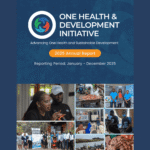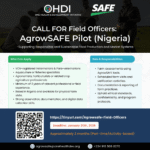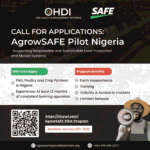One Health is the inter-disciplinary multi-sectoral collaboration of human, animal, and environmental health fields to ensure optimal and sustainable health outcomes. It thrives on the core principle that human, animal, and environmental health are intricately inter-connected to each other, and whatever affects one triad of health, has an impact on the other triads. Over the last decade, One Health has garnered support as a verified approach to sustainable health and development by industry professionals and institutions including World Health Organization (WHO), Center for Disease Control (CDC), Food and Agriculture Organization (FAO), and World Organization for Animal Health (OIE). However, there remains a huge gap in knowledge and practical implementation of the approach in practice especially in Africa where it is most needed.
The critical need to bridge this gap inspired the establishment of One Health and Development Initiative (OHDI), which is a non-profit organization that works to promote education, advocacy, and solutions to integrated issues of human, animal, and environmental health using the One Health approach. Though located in Abuja, Nigeria, the vision is global and the organization particularly focuses on designing and implementing its programs to be comprehensive and relevant to existing needs. The organization is run by a multidisciplinary team of young professionals, led by Dr. Kikiope Oluwarore, a veterinarian and public health professional. OHDI has also been internationally recognized for its work by the One Health Commission and has taken the responsibility of setting the pace in One Health practice, delivery, and advocacy in Nigeria while expanding its engagement with professionals in other countries.
The organization kicked off activities in March 2016 by educating the public through blog-posts (on MyAnimal,MyHealth blog) discussing various inter-related issues of human, animal, and environmental health. With increasing traction and engagement, OHDI secured a grant from Code for Africa in 2017 to implement Project Abattoir Nigeria, a public health project that investigated issues of unhealthy abattoirs, poor meat hygiene, and eating infected meat; educated abattoir workers; and engaged the Nigerian public in a media campaign. The series of successful media campaigns incited a public outcry and motivated policymakers (particularly in the case-study Ibadan Abattoir) to review the state of their abattoirs. A major positive outcome was the relocation of the hitherto stench-filled and dilapidated abattoir in Ibadan, to a more suitable, well-constructed, and environmental-friendly modern abattoir by the Oyo State government, and stricter enforcement of meat laws leading to an advancement in waste management and food safety in the city.
Since then the organization has gone on to implement several other short and long-term projects and research. Notable among these include the Project Fish and Oceans an investigation mandated by Internews Earth Journalism Network to report on Nigeria’s ocean resource conservation status and the country’s over-reliance on fish importation; the currently ongoing Project Animal Welfare in Nigeria (PAWN) supported by Animal Kind International which is working to promote humane education and improve animal welfare and access to quality animal health information and services; and the One Health Advocacy and Mentorship (OHAM) Fellowship Program which engaged young professionals in One Health learning, advocacy, and mentorship. In the OHAM Program, 13 young professionals working in medicine, veterinary medicine, environmental health, microbiology, conservation, and agriculture were engaged in a 6-month curriculum of learning and tasks in different aspects of One Health. In the end, they came out stronger and exposed, with deep-seated resolve to change their world through the application of One Health principles.
Speaking at the OHAM 2020 valedictory session, OHAM Fellow Dr. Idris Ola, a medical practitioner posited that, “The OHAM program has unlocked my mind to many perspectives in infectious disease control which I never thought about, or took for granted. I now have a full idea of what a health team should look like, who should constitute it, how ideas should be communicated, and how duties can be shared. I have also learned that a multidisciplinary/multi-sectoral approach is the only sure way if epidemic outbreaks and other health issues must be sustainably addressed”.
Another participant, Dr. Bukola Alaba, veterinarian, and University Lecturer had this to say: “Taking part in the OHAM fellowship learning sessions on Blue jeans, Slack, and the various enlightening webinars and tweetchats opened me up to the role of technology and communication, and how to apply them for efficiency in my work. Also, connecting with the mentor I was given is one of the high points of my career, as it has opened up new vistas of opportunities for my career, for which I am grateful to the OHDI Team”, she added.
Other key ongoing activities at OHDI include the bi-annual One Health Photo Competitions which has received entries from over 20 countries, continuous media engagements, and education through sharing of informative articles on various sectors of One Health, and the sharing of career opportunities in One Health.
With the spate of global distortions occasioned by climate change, emerging infectious disease proliferation, and food insecurity, One Health has become a necessary approach to sustainable health that all relevant professionals and institutions must begin to implement. In this regard, One Health and Development Initiative (OHDI) reinforces its commitment to promoting the ideals and values of One Health and will surely play a pivotal role in One Health policy development, research, and implementation in Nigeria and Africa.





